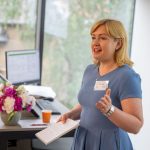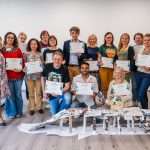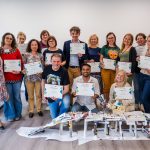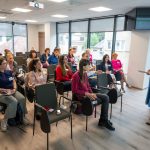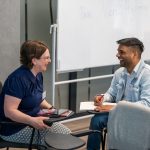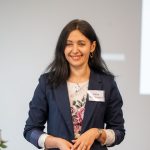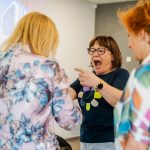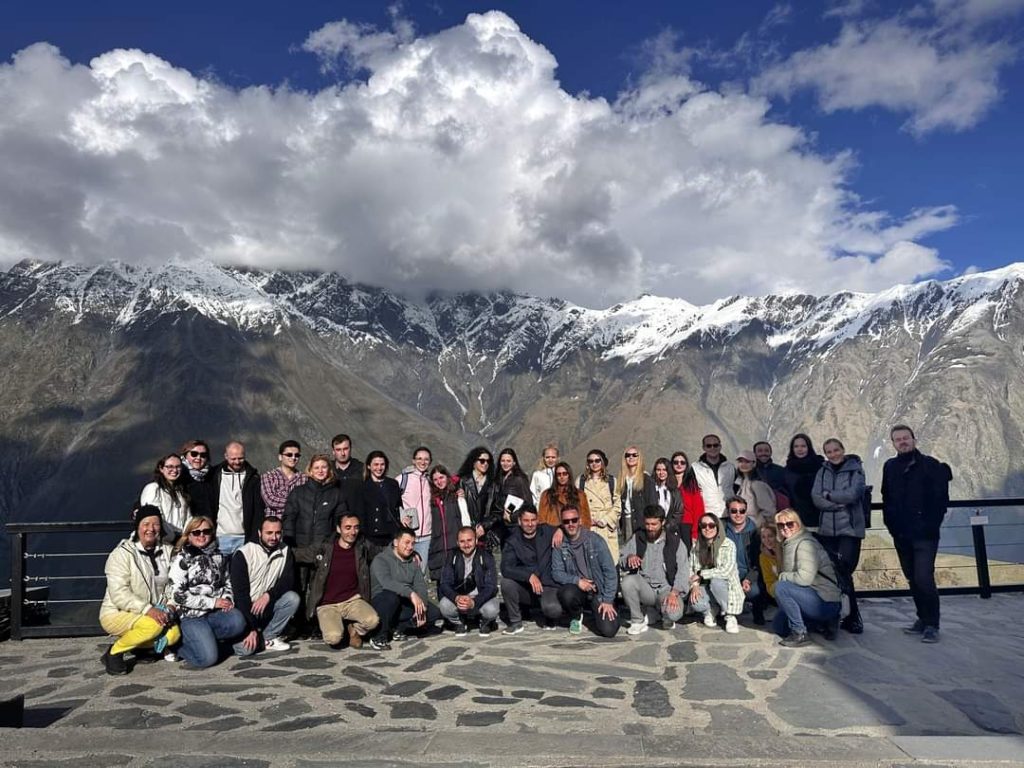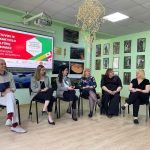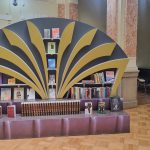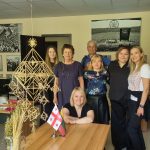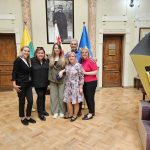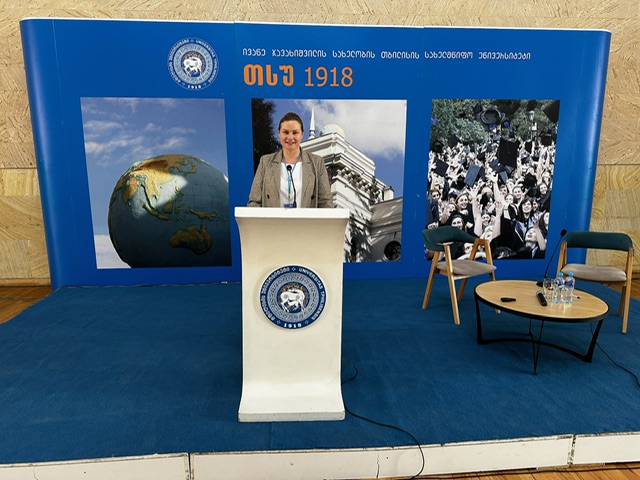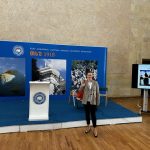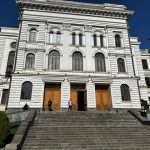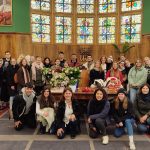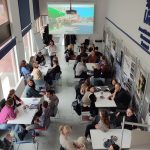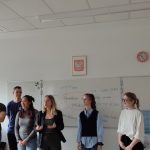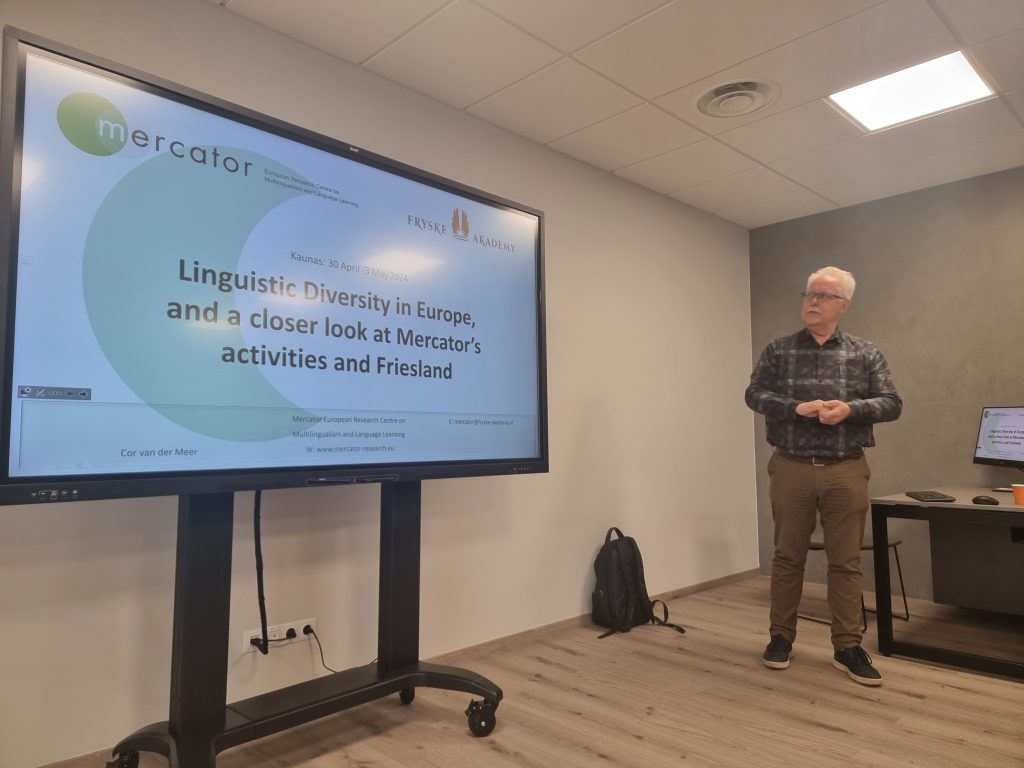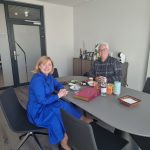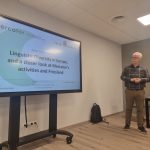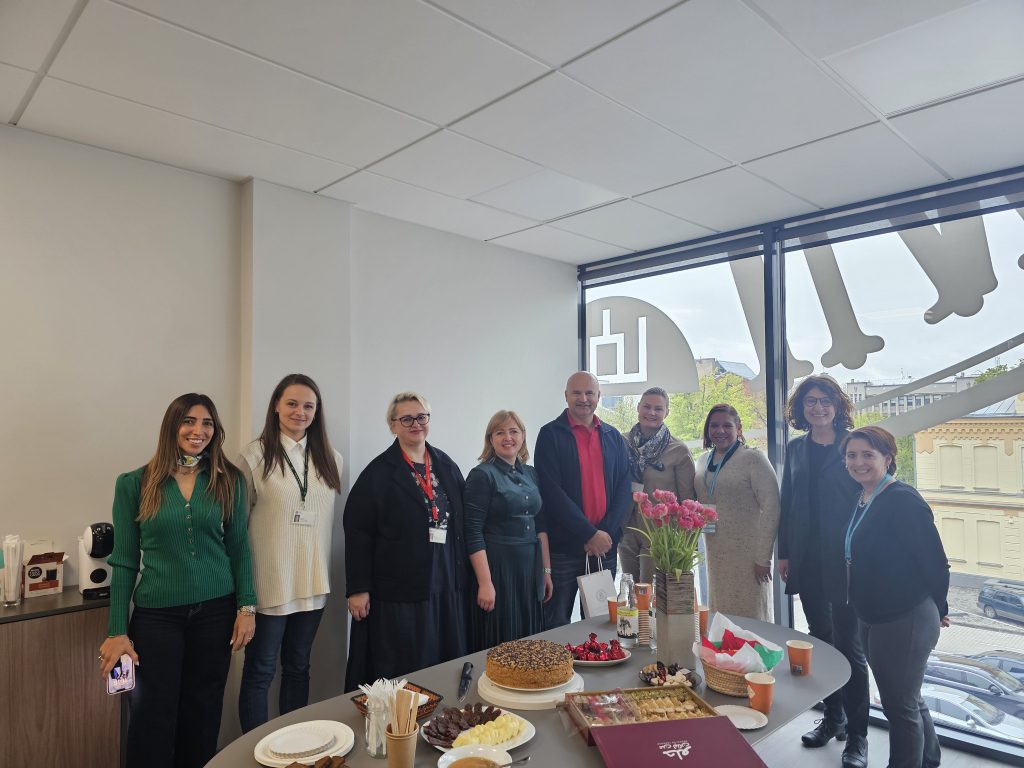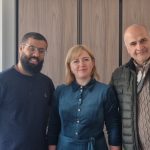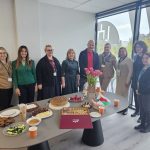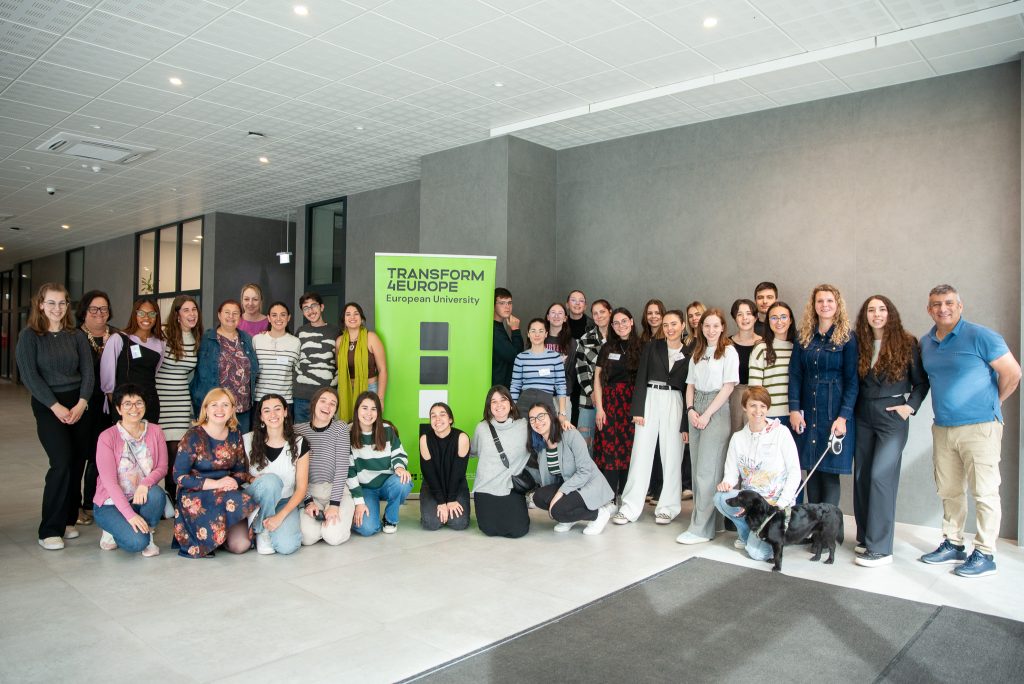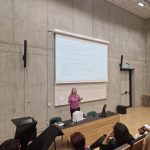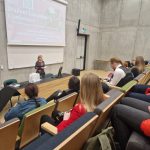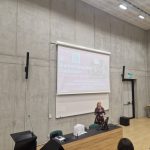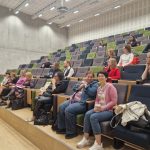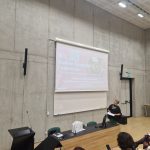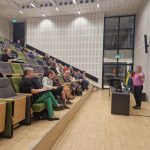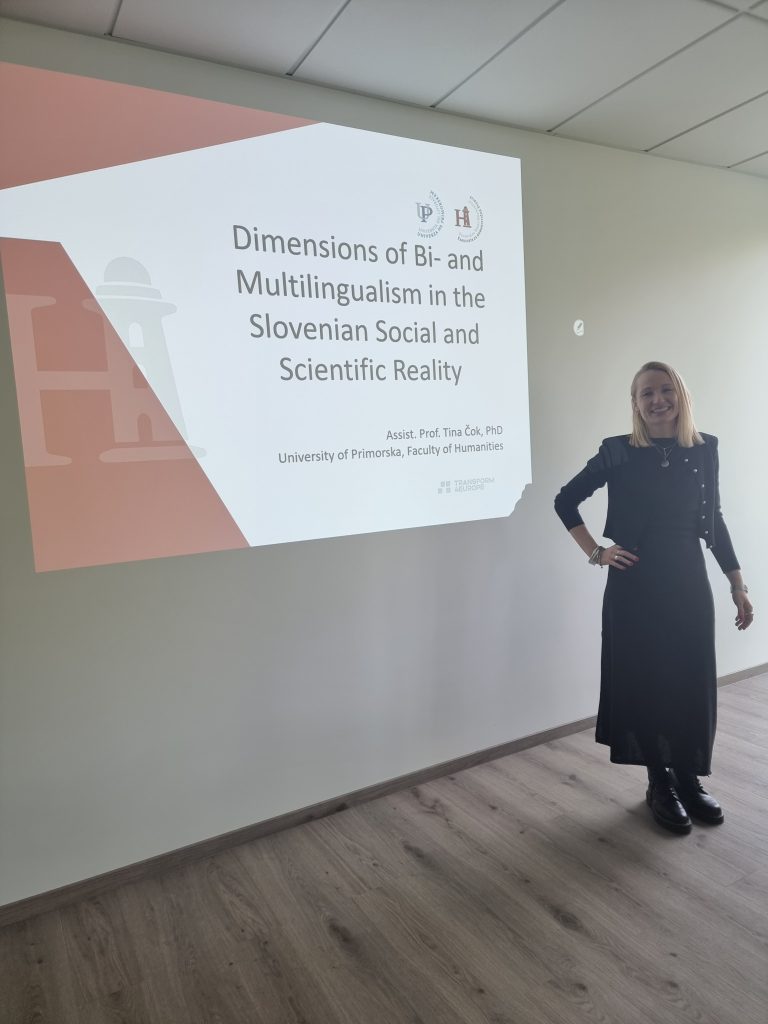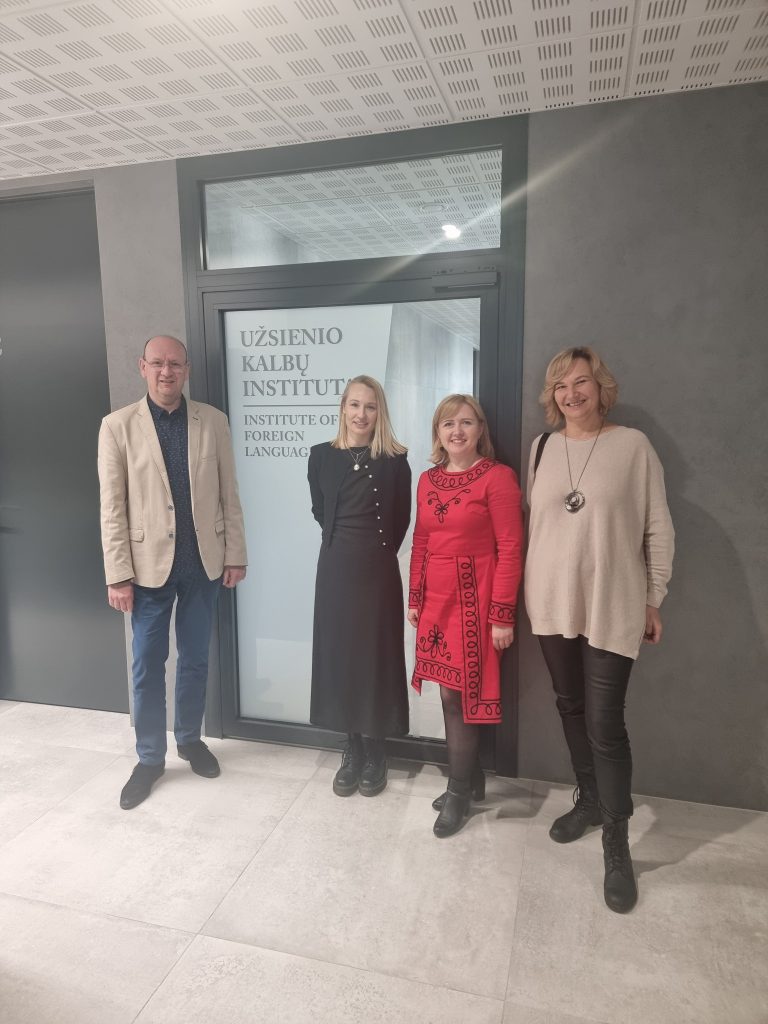Blended Intensive Program Focused on Improvement of Language Teaching
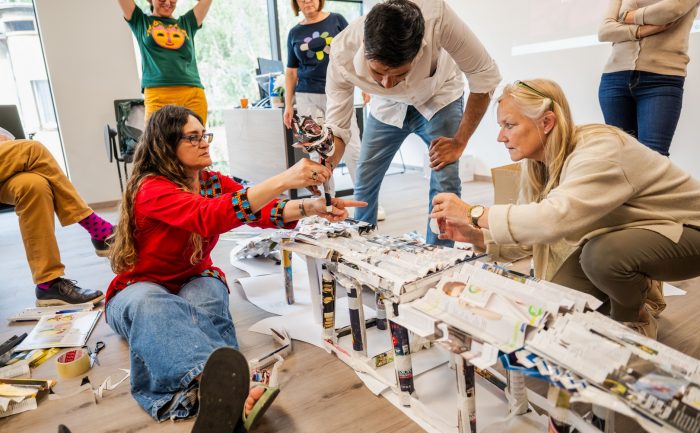
On 3–7 June, Vytautas Magnus University (VMU) hosted blended intensive program (BIP) for lecturers titled SALT: Strategies advancing language teaching, which welcomed language lecturers from Poland, Germany, Ireland, Ukraine, and Lithuania. The program was organised by the Transform4Europe Aliance and the VMU Institute of Foreign Languages.
During the event, the lecturers from the VMU Institute of Foreign Languages shared their experience of language teaching as well as the methods applied while teaching languages at the institute. Each day of the program was dedicated to a different subject: multilingualism and mediation, tools of information and communication technologies and artificial intelligence, flipped classroom, tools for the improvement of various skills (reading, writing, speaking etc.) and non-formal language learning methods.
“I think we managed to reach the goals, because the participants got very actively involved in activities and discussions, shared their insights, experiences, and activities. Moreover, the lecturers will have to each prepare two exercises while applying the methods and tools discussed this week; therefore, the final product will be an e-book with the activities that each participant will apply in their own context”, one of the event’s organizers, the head of the VMU Institute of Foreign Languages, Dr. Teresė Ringailienė, said.

Introducing the more interesting language-learning strategies, Dr. Ringailienė claims that it is particularly beneficial to employ the strategy of flipped classroom, which is based on active use of language during the lecture while performing team-based tasks: not by doing exercises, but by using the language while imitating ordinary real-life situations. Another strategy is functional language teaching, which is based on the function which one wishes to be capable of performing while using that language. Language-teaching strategies that encourage and enable multilingualism are a sufficiently new and widely discussed language-teaching methodology. For instance, “awakening by languages” stands out due to the fact that the learners’ native languages are used as a source of learning (teaching) which helps in the development of language-sensitive teaching and motivates one to be proud of their native language.
“Of course, like in many other fields, language learning is being significantly transformed by artificial intelligence; therefore, the training focused a lot on AI-generated content: how it can facilitate the lecturers’ preparation for lectures and improve the students’ language skills”, the Director of VMU Institute of Foreign Languages noted.
The lecturers who participated in the blended intensive program (BIP) say that the event left a particularly strong impression: not just because of the VMU professors’ lectures and illuminating insights but also the chance to get acquainted with other lecturers who came from different European countries as well as an interesting cultural program.
“The organizers prepared some events outside to “taste” Lithuania, we went to the country, to the straw gardens, which was also a very nice experience. The atmosphere was really great, all the people were very open and approachable, I think we will stay in touch with them. We had fun, we learned something. It was my first time in Lithuania, I hope that I will come back here again”, one of the BIP participants Urszula Michalik, a lecturer from the University of Silesia in Katowice (Poland), said.

Other lecturers who took part in the program also shared positive feedback. Christina Reissner, a lecturer from the University of Saarland (Germany), pointed out that, thanks to the event, she discovered many interesting new things about teaching, communicating with students, and better motivating them. “I enjoyed being here with all the colleagues from everywhere. It’s perfectly organized, and the staff is so open-minded and friendly. Everything was very fun”, Reissner summed up.
In the final presentation of the program, Dr. Ringailienė shared her insights on non-formal/informal language teaching formats that are often utilised by the VMU Institute of Foreign Languages. The institute organizes initiatives that help people get acquainted with various cultures and languages, learn new words, find friends, and communicate with international students. These events include the annually celebrated European Day of Languages and the International Mother Language Day, as well as tandem learning of Lithuanian-Ukrainian or Spanish-English languages, online event series Language Taster, the Primavera En Español festival organized by the VMU Miguel de Cervantes Spanish Language and Culture Club and many other events.
Culture Forum of Lithuania and Sakartvelo
On May 20-25, the cultural forum of Lithuania and Sakartvelo “Past Ties and Future Perspectives” was held at Prof. Vidas Kavaliauskas Centre for Lithuanian Language and Culture in Tbilisi, Sakartvelo. Dr. Teresė Ringailienė, the Director of the IFL, attended the event.
The participants of the forum listened to lectures on Lithuanian and Kartvelian theatre, the poetry of young poets from both countries (the anthology of young Kartvelian poets “Aidintys” translated into Lithuanian was presented), Sakartvelo in Lithuanian cinema and photography. The students studying the Lithuanian language took part in a workshop of making straw gardens, learned Lithuanian songs with the students from Vilnius University of Applied Sciences and taught others to sing Kartvelian songs.
A Lithuanian literature fund was opened in the National Parliamentary Library of Sakartvelo, while a Kartvelian literature fund is already open in M. Mažvydas Library in Lithuania. Both languages were also heard at the foot of Mount Kazbek, where the legend of A. Vienuolis “Cursed Monks” was read.
Also, a discussion “What opportunities does the Lithuanian language open up?” was held, which was attended by the alumnae of Prof. Vidas Kavaliauskas Centre for Lithuanian Language and Culture and the representatives of Lithuanian higher education institutions (KU, ViKo, VMU). Alumnae Sophio Tabatadze and Nino Inasaridze shared their success stories on how they managed to learn the Lithuanian language and how proficiency in the language can contribute to career changes.
It is rewarding and promising to see how learning languages and cultural activities bring people closer together. Sincerest thanks to the head of Prof. Vidas Kavaliauskas Lithuanian Language and Culture Centre, Maria Sulaberidze, colleagues from Klaipėda University and Vilnius University of Applied Sciences and all the participants of the forum for the fellowship and cooperation!
Visit at the University of Silesia
On May 6-10, Dr. Teresė Ringailienė, the director of the IFL, visited the University of Silesia (Katowice, Poland) on an Erasmus+ teaching visit. She gave lectures on intercultural communication, introduced students to the Institute of Foreign Languages, Vytautas Magnus University and the opportunities to study here as an exchange student or to join a blended intensive programme and organised a game about Lithuania. Some students impressed by the depth of their knowledge, while others learned many new things about their neighbouring country.
Dr. T. Ringailienė also met with representatives of the Humanities Faculties of the University of Silesia, shared good practices and discussed possibilities for future cooperation and joint activities or projects. Several lecturers will already be attending the blended intensive programme for language teachers organised by the Institute of Foreign Languages this June. It is delightful to experience close cooperation between neighbours and partners of the Transform4Europe university alliance.
Visit at Ivane Javakhishvili Tbilisi State University in Georgia
On April 12-19, English lecturer Dr. Indrė Koverienė visited Ivane Javakhishvili Tbilisi State University in Georgia. During the visit, the lecturer not only became acquainted with the oldest university in the South Caucasus region in detail but also had the opportunity to present the activities of the Institute of Foreign Languages at Vytautas Magnus University.
Comparing the mentioned universities, one can notice not only a number of historical parallels, such as the reasons and era of the founding of the universities, but also an obviously similar approach to the mother tongue and multilingualism. Since its establishment, the educational process of Tbilisi State University has been organized in the Georgian language to preserve and nurture the native language of the small nation. It is interesting that it was the only higher education institution in the former Russian Empire that implemented such a decision.
Another similarity is the number of foreign languages offered. VMU students, regardless of the study program, have a special opportunity to choose how many and which languages to learn from the 30 modern and classical languages offered. Students at Tbilisi State University have the opportunity to choose from an even wider list of foreign languages – as many as 40 of them. One can only be happy that small nations learn languages and are well aware that, as Johann Wolfgang von Goethe once said: ‘He who does not know foreign languages does not know anything about his own.’
UKI lecturers and a group of students visited Adam Mickiewicz University in Poznan
At the end of April, UKI lecturers and a group of students visited Adam Mickiewicz University in Poznan, where they worked together with Polish, German and Spanish colleagues to develop strategies to improve access to quality education. Topics discussed included support measures for teachers, ways to involve and engage the community in students’ education, teaching socially vulnerable groups, and the use of the latest IT technologies and tools in teaching. Finally, the importance of communication and cooperation between European countries for a better today and a brighter tomorrow in the region was reassessed.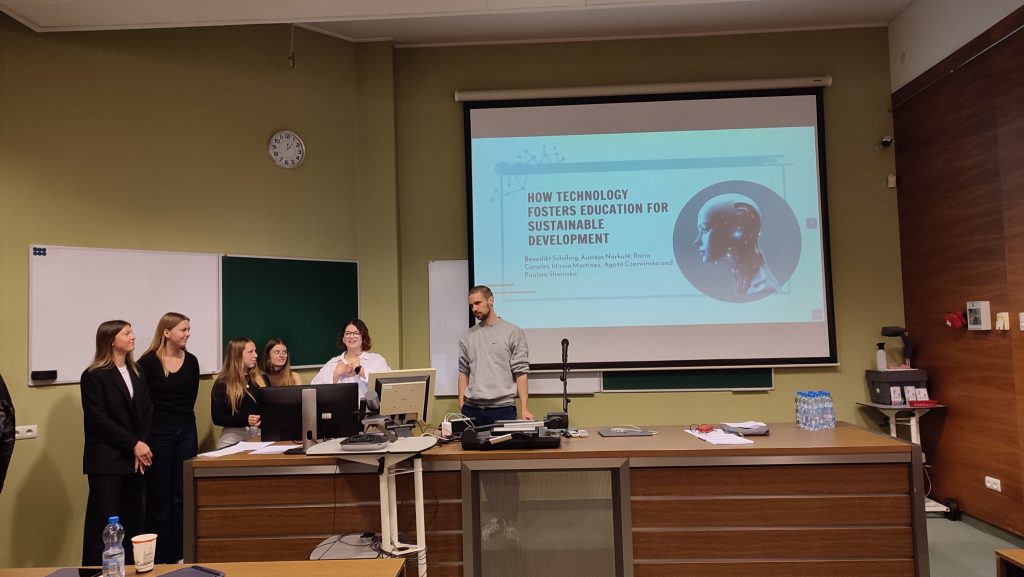
This week, Dr Cor van der Meer from Mercator, the European Research Centre for Multilingualism and Language Learning, visited UKI under the Erasmus+ programme
This week the IFL hosted Dr. Cor van der Meer from Mercator, the European Research Centre on Multilingualism and Language Learning. He gave lectures to students on “Linguistic Diversity in Europe and a look at Mercator’s activities and Friesland” and to the IFL lecturers on “Multilingualism, Education and Policy in Europe and Friesland.” The guest shared his experience and research on multilingualism and projects implemented to promote multilingualism, had discussions with the IFL lecturers and discussed future cooperation opportunities.
Teaching visits at the IFL
Last week the fourth International Staff Week was held at VMU. 118 participants from 48 countries visited the University. Guests from Bosnia, Germany, Lebanon, Mexico, and the USA gave lectures in English, Spanish and German at the IFL. The students learnt many interesting things about foreign universities, cultural realia, traditions and dialects, and the lecturers were delighted with the curious and inquisitive students. The guests also met with the IFL lecturers.
Prof. Dr. Nemira Mačianskienė led the training courses “Intercultural Communication Competence Development: Gaining Effective Strategies to Deal with Misunderstandings and Cross-Cultural Barriers” and “Intercultural Communication Competence Development: Effective Communication Strategies”, while the IFL Director, Dr. T. Ringailienė, introduced all the VMU guests to the Lithuanian language.
Director of the IFL also met with guests from Albania and Brazil, with whom she discussed possibilities for further cooperation.
Blended intensive programme was held at the IFL
On 8–12 April, Vytautas Magnus University (VMU) was bustling with international students who participated in a blended intensive Erasmus program (BIP). The program, organized by the European university alliance Transform4Europe and the VMU Institute of Foreign Languages, attracted undergraduate students from Bulgaria, Lithuania, Slovenia, and Spain.
The 11-day program invited these students to immerse themselves in different cultures, gain intercultural communication skills, acquire practical research experience, and deepen their understanding of language usage and cultural norms. The course was split into remote and in-person segments and awarded 4 ECTS credits. During the six days of remote lectures, faculty from VMU, the University of Primorska, Sofia University, and the University of Alicante covered various topics including digital tools for academic writing, developing intercultural competencies, and multilingualism.
More about the event read her
Student Language Conference 2024, “Let’s Grow Together. Future university in the next century!”
On April 12, 2024, Foreign Language Institute at Vytautas Magnus University held the third student language conference “Let’s Grow Together. Future university in the next century!” This conference was the first international conference featuring student presentations from Bulgaria, Spain, Ukraine, and Belarus. Furthermore, the plenary speaker Dr. Martina Paradiž, from the University of Primorska in Slovenia captured attention and mesmerized students with the report “Artificial intelligence in language learning: tools, tips and tricks” where she provided practical tools and examples of how to enhance learning with various AI tools. This relevant topic and discussion inspired and accompanied the students throughout the conference. The student presenters surprised the audience with their excellent academic English, depth of the topics, desire to cooperate, lead, and solve global issues. Papers were read in three sections: language learning and pedagogy, physical and psychological well-being, and economic trends.
The section “Language learning and pedagogy” (moderator – UKI lecturer Vaida Misevičiūtė) featured one speaker from VMU and four from foreign universities. The presentations focused on the intricacies of language learning, the importance of multilingualism, creativity in education to avoid getting lost in the maze of artificial intelligence. Presentation topics reflected current issues and trends relevant to students and teachers and engaged the audience into a lively discussion.
The section “Physical and psychological well-being” (moderator – UKI lecturer Aušra Jankauskaitė) was attended by four speakers from VDU and Saint Kliment Ohridski University of Sofia (Bulgaria). The presentations dealt with people’s psychological problems and well-being, which are especially relevant for students: lack of adequate sleep and its causes were discussed, breathing techniques that help overcome stress were highlighted. The presentation of a student of the Faculty of Psychology about the state of daydreaming, which sometimes indicates more serious mental health problems, received special attention. It should be noted that almost all the presentations included research results carried out by the authors themselves.
In the “Economic Trends” section (moderator – Dr. Jurgita Macijauskaitė-Bonda), five presentations in English by students of VMU and partner foreign universities were delivered. Urtė
Endriukaitytė and Lika Varshanidze, students of the VMU Faculty of Economics and Management, presented a study comparing how Covid-19 affected business in Lithuania and Sakartveli. Aida Bulatova’s report focused on innovation in the field of finance, and Aleksander Hristov, a student at Saint Kliment Ohridski University in Sofia (Bulgaria), reviewed the realities of the Schengen area. The review report on the Japanese film industry by VMU students Cheng-Yun Su, Oksana Iščenko and Žygimantas Gusto attracted a lot of interest, and the section ended with the report of Jokūbas Vasiliūnas, historian of the Faculty of Humanities of VMU, in which he presented the research conducted on the extent to which respondents know Kaunas and its history.
Students learning languages at the A1-B1 level were also encouraged to feature their language skills. They were invited to create comics on the topic “I’m learning a language”. The participants were asked to creatively convey situations about language learning, lack of communication, or cultural differences and reveal the pleasures and challenges of language learning in a funny and attractive way. Four high school students and one VMU student studying German, Spanish and French participated in the contest. The winners of the first, (S. Daukanto Gynmasium), second (S. Daukanto Gymnasium) and third (VMU and VMU “Atžalyno” Pro-gymnasium) were awarded certificates and small gifts. The students wittily demonstrated their knowledge of foreign languages, reminded that languages can be learned from cartoons, and encouraged to deepen language knowledge by revealing the dangers of miscommunication by using the same word incorrectly in Spain and Venezuela.
Guests from the Universities of Silesia and Primorska
Last week, the IFL had some guests: Iwona Wojtala and Andrzej Wojtala from the University of Silesia (Poland) and Dr. Tina Čok from the University of Primorska (Slovenia), who came to VMU on Erasmus+ teaching visits. The guests not only gave lectures to the students of the institute but also met with the teachers and shared their research and language teaching experiences. We are delighted to have a meaningful collaboration with these Transform4Europe University Alliance partners.
- Activate your English A1-A2: intensive semester course
- Activate your English A2-B1: intensive semester course
- Activate your English B1-B2: intensive semester course
- Alumni
- Conference
- Conferences
- Courses
- Home
- IFL Research Cluster
- İngilizce Hazırlık Kursu “English Prep-Course”
- Language learning
- News
- Research
- Scientific Journal “Sustainable Multilingualism”
- Students
- Подготовительный курс английского языка “English Prep-Course”
- About us
- Contacts


